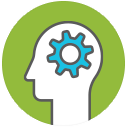 About LearningLinks
About LearningLinks
Please read over the following, once you are ready to register click here to register
Why is it Important?
Access to child and adolescent psychiatrists in BC is limited. There are approximately 84,000 children and youth in BC who meet full DSM IV TR criteria for a mental health disorder. Of these, access data tell us that approximately 26, 000/year receive services from MCFD Child and Youth Mental Health Teams in communities throughout BC and 3,500/year access tertiary mental health services at BC Children’s Hospital, leaving the vast majority of children and youth with mental health disorders not identified, assessed or treated.
In communities throughout BC, pediatricians and general psychiatrists are called upon to provide consultation for children and youth with psychiatric illnesses. Feedback from these practitioners indicates that they would like to have more in-depth training in child and adolescent psychiatry in order to manage these consultative expectations.
What is LearningLinks?
LearningLinks: Enhanced Learning Series in Child and Youth Mental Health (CYMH) aims to improve access for children, youth and families to medical specialists with expertise in child and adolescent psychiatry. In line with the PSP modules for primary care providers, this Learning Series provides enhanced learning for specialists, such as paediatricians or general psychiatrists, to support cascading access to high quality evidence informed child and youth mental health care across BC.
LearningLinks was developed for busy professionals. The 15-module resource is an interactive and online tool that can be completed at your own pace, with each module taking approximately 30-60 minutes to complete. The resource can be completed any time, from any computer or smart phone.
What will I learn?
LearningLinks has 15 modules, designed to enhance knowledge, skills and confidence of health care professionals in child and youth mental health by exploring and learning about:
- Mental health topic areas through different types of mediums;
- Diagnosis, management, psychopharmacology and emergent presentations;
- Up-to-date and evidence-based resources for clinicians, patients and their families.
Module 1: Anxiety Disorders
Module 2: Attachment Disorders
Module 3: Building Rapport with Children and Youth
Module 4: Depressive & Mood Disorders
- Depression (Major and Minor)
- Bi-polar Disorder
Module 5: Disruptive, Impulse-Control & Conduct Disorders
- Oppositional Defiant Disorder
- Conduct Disorder
Module 6: Emergent Presentations
- Emergency Psychiatry
- Non-suicidal Self Injury
- Suicide Risk Assessment
Module 7: Feeding & Eating Disorders
- Eating Disorders
Module 8: Neurodevelopmental Disorders
- ADHD
- Tic Disorders
Module 9: Obsessive Compulsive & Related Disorders
- OCD
Module 10: Psychotic Disorders
- Early Psychosis
Module 11: Gender Dysphoria
Module 12: Sleep Disorders
Module 13: Somatoform Disorders
Module 14: Substance Related & Addictive Disorders
- Substance Use and Concurrent Disorders
Module 15: Trauma & Stressor Related Disorders
Following completion of LearningLinks, eligible physicians can submit for professional development or continuing education credits here.
Non-physicians should contact their designated College or institution to inquire about claiming self-directed credits upon completion of Learning Links.
